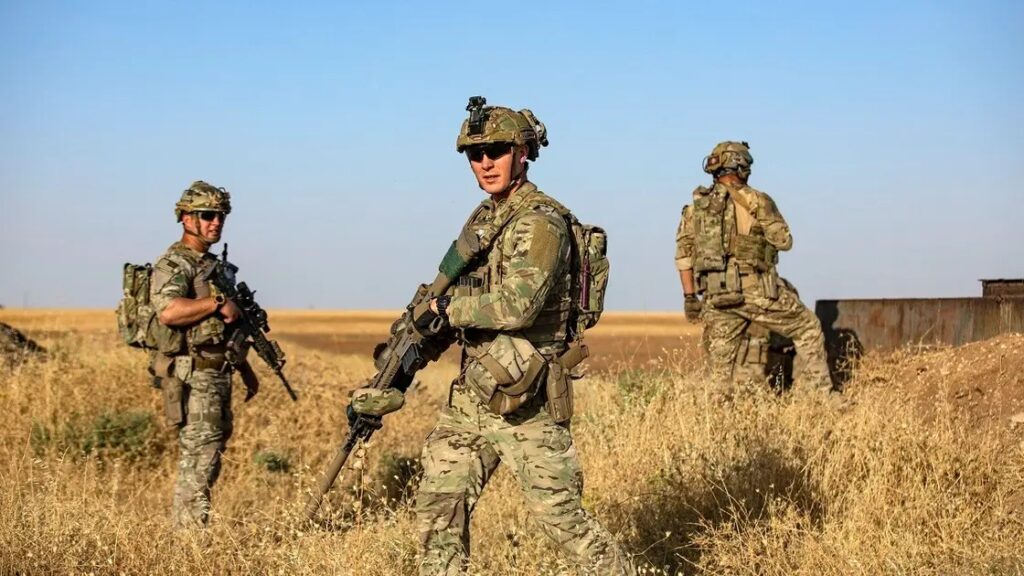
“Time will tell if that develops, and if it does, the counter-ISIS campaign will come under considerably more pressure than it is today,” one expert tells Al Arabiya English.
The US military said Friday that it had the right to self-defense any time it’s faced with threats and cautioned against distracting from the fight against ISIS after a Turkish drone came within close distance to its troops in Syria.
“Over the past 24 hours, multiple uncoordinated air strikes were conducted in close proximity of US forces in Syria,” a statement from the Combined Joint Task Force-Operation Inherent Resolve said.
On Thursday, an American F-16 was dispatched and shot down a Turkish drone after it came inside a declared US-restricted operating zone, less than half a kilometer away from American troops.
US officials warned the Turkish military several times about coming close to American forces.
“We oppose actions which threaten regional stability and security; jeopardize the safety of our forces, partner forces, and the civilian population; and distract from our shared commitment to the enduring defeat of [ISIS],” CJTF-OIR said.
“We reserve our inherent right to self-defense any time when faced with threats that place our forces in harm’s way,” they added.
The top US military general, Gen. CQ Brown, and the Pentagon chief, Secretary Lloyd Austin, held separate calls with their Turkish counterparts hours after the American F-16 destroyed Turkey’s drone.
On Friday, Secretary of State Antony Blinken spoke with Turkey’s top diplomat, stressing the need to “coordinate and deconflict our activities.”
US officials have been wary about criticizing the NATO ally, which continues to carry out air strikes against Kurdish militants in Syria against members of the Kurdistan Workers Party (PKK).
The PKK is designated by the US as a terrorist group, but the US-backed Syrian Democratic Forces (SDF) are not. Ankara has been irked by Washington’s continued support for the SDF, which has been a critical ally in the fight against ISIS.
Earlier this year, a Turkish drone targeted a convoy of SDF commander Mazloum Abdi in Iraq. Three US servicemembers were in the convoy, but they escaped unharmed.
“Every time there’s a flare-up between Turkey and the SDF, there’s no doubt that the campaign against ISIS is at least temporarily diminished in the northeast — though little practically changes in the east, where the challenge is most acute,” said Charles Lister, a senior fellow at the Washington-based Middle East Institute.
But both sides appear to be trying to de-escalate, according to James Jeffrey, the former Special Envoy to the Global Coalition to Defeat ISIS.
He pointed to the US and Turkey having “huge joint issues with each side, to some degree, dependent upon the other.”
Jeffrey pointed out that American and Turkish presence in northwest Syria forms a barrier against the Assad regime, Russia, Iran and ISIS.
Separately, the US hopes to convince Turkey’s Recep Tayyip Erdogan to lift his hold on Sweden’s NATO membership, while the latter wants Congressional approval of F-16 sales to Turkey.
Turkey was kicked out of the F-35 fighter jet program after it was sanctioned by the US for its purchase of Russian surface-to-air missile defense systems.
However, there’s always a chance tensions could spiral out of control, as was the case in October 2019 when the Trump administration sanctioned Turkish officials and institutions after its military operation into northern Syria.
And if the Turkish military hits “hard enough” at infrastructure in northeastern Syria from the air, this could impair counter-ISIS operations, Jeffrey said.
Lister said that would depend on how long Turkey’s campaign continued and how deep it reached.
“Time will tell if that develops, and if it does, the counter-ISIS campaign will come under considerably more pressure than it is today,” he told Al Arabiya English.
